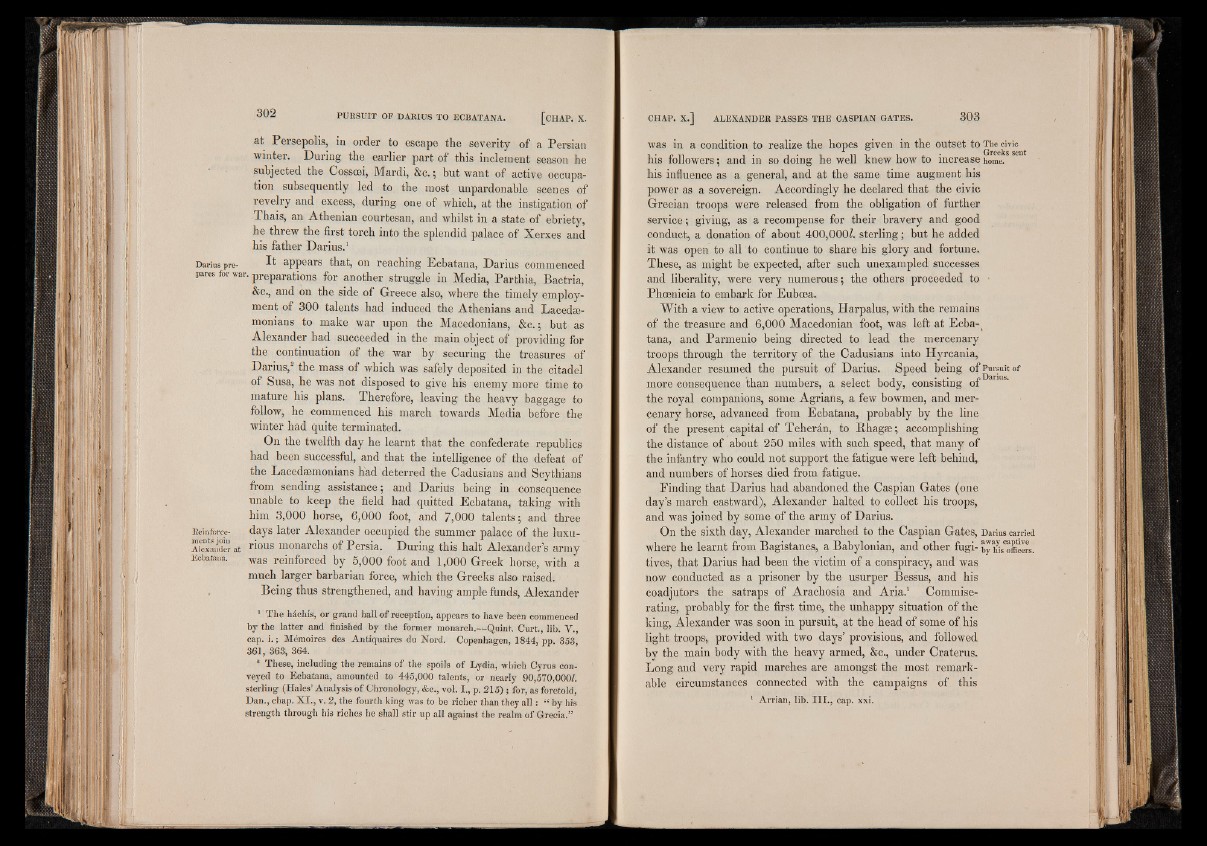
Darius prepares
for jwi
Reinforcements
join
Alexander at
Kcbatana.
at Persepolis, in order to escape the severity of a Persian
winter. During the earlier part of this inclement season he
subjected the Cossoei, Mardi, &c. ; but want of active occupation
subsequently led to the most unpardonable scenes of
revelry and excess, during one of which, at the instigation of
Thais, an Athenian courtesan, and whilst in a state of ebriety,
he threw the first torch into the splendid palace of Xerxes and
his father Darius.1
It appears that, on reaching Ecbatana, Darius commenced
r- preparations for another struggle in Media, Parthia, Bactria,
&c., and on the side of Greece also, where the timely employment
of 300 talents had induced the Athenians and Lacedaemonians
to make war upon the Macedonians, &c. ; but as
Alexander had succeeded in the main object of providing for
the continuation of the war by securing the treasures of
Darius,2 the mass of which was safely deposited in the citadel
of Susa, he was not disposed to give his enemy more time to
mature his plans. Therefore, leaving the heavy baggage to
follow, he commenced his march towards Media before the
winter had quite terminated.
On the twelfth day he learnt that the confederate republics
had been successful, and that the intelligence of the defeat of
the Lacedaemonians had deterred the Cadusians and Scythians
from sending assistance; and Darius being in consequence
unable to keep the field had quitted Ecbatana, taking with
him 3,000 horse, 6,000 foot, and 7,000 talents; and three
days later Alexander occupied the summer palace of the luxurious
monarchs of Persia. During this halt Alexander’s army
was reinforced by 5,000 foot and 1,000 Greek horse, with a
much larger barbarian force, which the Greeks also raised.
Being thus strengthened, and having ample funds, Alexander
1 The hachis, or grand hall of reception, appears to have been commenced
by the latter and finished by the former monarch.—Quint. Curt., lib. V.,
cap. i. Mémoires des Antiquaires du Nord. Copenhagen, 1844, pp. 353,
361, 363, 364.
s These, including the remains o f the spoils of Lydia, which Cyrus conveyed
to Ecbatana, amounted to 445,000 talents, or nearly 90,570,000/.
sterling (Hales’ Analysis o f Chronology, &c., vol. I., p. 215) ; for, as foretold,
Dan., chap. X I., v. 2, the fourth king was to be richer than they all : “ by his
strength through his riches he shall stir up all against the realm of Grecia.”
was in a condition to realize the hopes given in the outset to The civic
, Greeks sent his followers; and in so doing he well knew how to increase home,
his influence as a general, and at the same time augment his
power as a sovereign. Accordingly he declared that the civic
Grecian troops were released from the obligation of further
service; giving, as a recompense for their bravery and good
conduct, a donation of about 400,000/. sterling; but he added
it was open to all to continue to share his glory and fortune.
These, as might be expected, after such unexampled successes
and liberality, were very numerous; the others proceeded to <
Phoenicia to embark for Euboea.
With a view to active operations, Harpalus, with the remains
of the treasure and 6,000 Macedonian foot, was left at Ecba-i
tana, and Parmenio being directed to lead the mercenary
troops through the territory of the Cadusians into Hyrcania,
Alexander resumed the pursuit of Darius. Speed being of Pursuit of
more consequence than numbers, a seleet body, consisting of Il5‘
the royal companions, some Agrians, a few bowmen, and mercenary
horse, advanced from Ecbatana, probably by the line
of the present capital of Teherán, to Rhagae; accomplishing
the distance of about 250 miles with such speed, that many of
the infantry who could not support the fatigue were left behind,
and numbers of horses died from fatigue.
Finding that Darius had abandoned the Caspian Gates (one
day’s march eastward), Alexander halted to collect his troops,
and was joined by some of the army of Darius.
On the sixth day, Alexander marched to the Caspian Gates, Darius carried
where he learnt from Bagistanes, a Babylonian, and other fugi- by Ms°officers.
tives, that Darius had been the victim of a conspiracy, and was
now conducted as a prisoner by the usurper Bessus, and his
coadjutors the satraps of Arachosia and Aria.1 Commiserating,
probably for the first time, the unhappy situation of the
king, Alexander was, soon in pursuit, at the head of some of his
light troops, provided with two days’ provisions, and followed
by the main body with the heavy armed, &c., under Craterus.
Long and very rapid marches are amongst the most remarkable
circumstances connected with the campaigns of this
1 Arrian, lib. I I I ., cap. xxi.